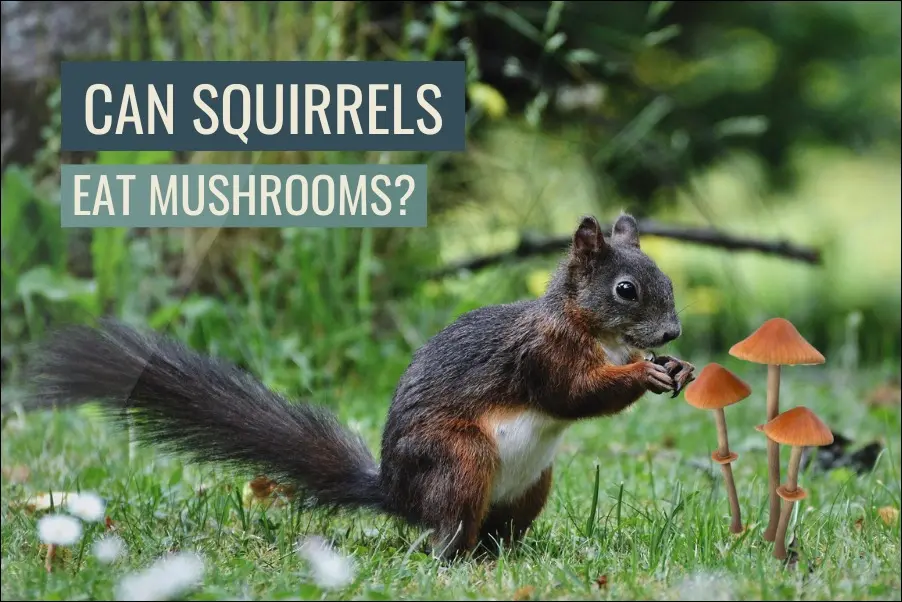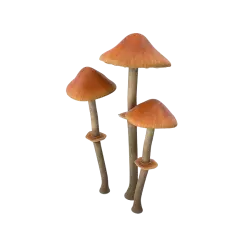
It’s a damp morning in the forest. You spot a squirrel sniffing around a patch of mushrooms. But wait—can squirrels actually eat those?
Yes, squirrels do eat mushrooms, including some types that are toxic to humans. Their digestive systems are adapted to handle a variety of fungi, and mushrooms are an important seasonal food source—especially in fall and winter.
Why do squirrels eat mushrooms?
Squirrels are opportunistic foragers. They eat what they find, and mushrooms are often abundant in forests and wooded areas, especially after rain. Mushrooms provide both moisture and nutrients, making them a smart snack for survival.
What makes this fascinating is that squirrels often consume mushrooms that are considered toxic or even deadly to humans. In fact, red squirrels have been observed eating fly agaric (Amanita muscaria), a mushroom that would cause hallucinations or poisoning in people.
Researchers believe that squirrels might have evolved physiological adaptations that allow them to tolerate compounds that would harm other species. Still, young or sick squirrels may not have the same resistance, so it’s always a calculated risk in the wild.
This willingness to explore risky foods might remind you of other odd squirrel behaviors—like digging up your flowerpots. If you’ve ever had that problem, you might enjoy reading about why squirrels dig in potted plants.
Do squirrels prefer certain types of mushrooms?

Yes, some types are more popular among squirrels than others. Wild footage and studies show that squirrels tend to go for:
- Puffballs
- Morels
- Boletes
- Bracket fungi
- Amanita species (even toxic ones)
- Russulas
The exact preferences may vary depending on the species of squirrel, the local ecosystem, and the season. Squirrels are incredibly adaptive, and what they eat in Michigan may differ from what they eat in Oregon.
If you’re curious about regional squirrel behavior, this article about why squirrels are black in Michigan is worth a read.
How do squirrels store mushrooms?
Red squirrels, in particular, are famous for drying mushrooms. They’ll pick mushrooms from the ground, carry them up into trees, and impale them on twigs or branches to dry in the air. Once dried, the mushrooms are stashed in tree hollows or other secure places.
This behavior is known as “mushroom caching” and plays a critical role in their winter survival. Dried mushrooms last longer, don’t rot as quickly, and are easier to digest in cold months when water is scarce.
Just like they do with nuts and seeds, squirrels plan ahead. You can learn more about this by reading how squirrels prepare for winter.
Are mushrooms part of a squirrel’s winter diet?
Yes. Dried mushrooms become a crucial backup food source in the winter. When snow covers the ground and other food is hard to find, squirrels return to their hidden caches to nibble on mushrooms, nuts, and seeds.
What’s really fascinating is that squirrels are among the few mammals known to use fungi this way. It’s a behavior rooted in instinct and refined through learning and experience.
If you’re interested in supporting squirrels during the colder months, check out our guide on what to feed and how to help squirrels during winter.
Are mushrooms safe for pet or rescue squirrels?
Store-bought mushrooms like button, portobello, and shiitake are generally safe in small amounts for healthy squirrels. But you should never offer wild mushrooms to a pet or rescue squirrel unless you are 100% sure of the species.
Avoid giving mushrooms that have been cooked with oil, butter, garlic, or salt. These additives can be harmful to their digestive systems. Also, introduce new foods slowly to monitor for any unusual reactions.
If you’ve taken in a lost or injured squirrel and want to support its diet, we recommend reading about how to help a newborn squirrel and how to help a lost squirrel.
Can mushrooms be dangerous to squirrels?
Some mushrooms can still pose a threat—especially to young, sick, or malnourished squirrels. While adult squirrels might tolerate certain toxins, it doesn’t mean all mushrooms are harmless.
Sick squirrels may also be more sensitive. For example, squirrels suffering from mange or dehydration might not digest fungi as efficiently.
If you’re concerned about squirrel health, you may want to check our articles on how to help a dehydrated squirrel or how to help squirrels with mange.
Do squirrels eat mushrooms in every season?
Mushrooms are most commonly eaten in late summer and fall, when fungi are most abundant. However, if stored properly, dried mushrooms become year-round nutrition—especially during winter.
In spring and summer, squirrels shift toward fresh greens, buds, fruits, and insects. Their seasonal flexibility is one reason they thrive in both urban and rural environments.
If you’re curious about how squirrel behavior changes throughout the year, here’s a guide to helping squirrels in spring and how to help them in summer.
Should you feed wild squirrels mushrooms?
You can, but there are a few rules:
- Use raw, store-bought mushrooms only
- Never offer cooked, seasoned, or moldy fungi
- Place food near natural shelter (trees, bushes)
- Don’t overfeed—variety is important
Squirrels love choice. In fact, mushrooms are just one small part of a diverse diet that includes fruits, seeds, bark, and even insects. If you’re planning to supplement wild diets, this list of over 20 fruits squirrels can and can’t eat is a great resource.
Do squirrels ever act strange after eating mushrooms?
Not usually. Even when they consume mushrooms toxic to humans, squirrels rarely show signs of illness. However, some researchers have speculated that they may experience subtle behavioral changes.
It’s also possible that their high activity, scratching, or chasing behavior could increase. If you’re wondering about those odd habits, we have helpful articles that explain why squirrels scratch so much and why they always chase each other.
Final thoughts: mushrooms and squirrel survival
Mushrooms are more than a snack—they’re survival tools. From hydration to nutrition to clever winter storage, fungi play a unique role in the life of a squirrel.
By understanding and supporting this behavior, we can help squirrels thrive. Whether you leave out safe mushrooms, plant native trees, or protect forest undergrowth, you’re making a difference.
Want to take your help one step further? Consider reading about how squirrels build nests—it’s one of the most amazing behaviors in their toolkit.
